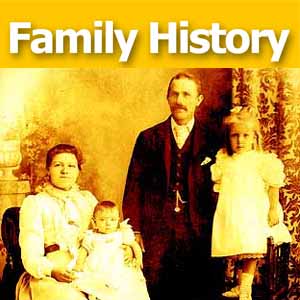by Lisa Cooke | Jan 13, 2014 | 01 What's New, DNA
 It’s not uncommon for genetic DNA tests to reveal that you’re not related to people you thought you were. But here’s a twist I’ve never heard before.
It’s not uncommon for genetic DNA tests to reveal that you’re not related to people you thought you were. But here’s a twist I’ve never heard before.
A family who had a daughter by artificial insemination of the husband’s sperm eventually decided to do some DNA testing for family history. Imagine the wife’s shock when she discovered that her husband and daughter shared no DNA!
They got a bigger shock when they did a little research. Apparently the biological father worked at the lab that handled the family’s insemination process. The man is dead now, but it appears he may have deliberately swapped in his own sample for the father’s.
Of course lots of questions have come up–including how many other children may have received the DNA of a man who was a convicted kidnapper.
My heart goes out to this family and to others who now fear their genetic fatherhood was hijacked. Read the full story here (it’s popped up in several news outlets now, but I first saw it at KUTV.com).
by Lisa Cooke | Jan 7, 2014 | 01 What's New, Ancestry, DNA, Family History Podcast, FamilySearch, Organization, Photographs

No episode! But lots of good updates. Keep reading….
UNLUCKY Episode 13: Genetic Genealogy and Photo Sharing
Episode 13 of the original podcast reviewed genetic genealogy and photo sharing products that are either now longer offered or are outdated. This episode is not being republished with the series.
Fortunately, lots of advances have been made in both genetic genealogy services and photo sharing and tagging, and we’ve got lots of current resources for you.
Genetic Genealogy (DNA)
Start here where you’ll find answers to common questions, a free introductory video, and additional DNA resources
Next, listen to my interview with Dr. Turi King, who used DNA to identify King Richard III. That interview is on my Premium Podcast (available by subscription) and talks about what DNA can tell us–and what it can’t.
Another interview you might enjoy is with Bennett Greenspan from Family Tree DNA, featured in Premium Podcast Episode 92.
 (Not a Premium Member? Check out all the great membership benefits–including members-only premium podcast episodes, full access to the premium podcast archive for an entire year, video recordings of some of my most popular classes and even premium videos that teach you some of the most important skills for 21-st century genealogists.)
(Not a Premium Member? Check out all the great membership benefits–including members-only premium podcast episodes, full access to the premium podcast archive for an entire year, video recordings of some of my most popular classes and even premium videos that teach you some of the most important skills for 21-st century genealogists.)
Free Photo Sharing Resources
Flickr
Photobucket
In addition, remember that Ancestry.com, FamilySearch.org, MyHeritage.com and other genealogy sites have excellent photo-sharing services for those who don’t mind sharing their images with the public.
by Lisa Cooke | Dec 18, 2013 | 01 What's New, DNA
I recently blogged about some governmental red tape being faced by 23andMe. They have suspended sales of their “health-related genetic tests” and stopped providing interpretive information about those tests, but are continuing to offer their genealogy products. Just thought I’d share!
by Lisa Cooke | Dec 4, 2013 | 01 What's New, DNA, images
There’s been a lot of buzz lately over 23andMe’s genetic testing products and services. The company has ongoing issues with the Food and Drug Administration (FDA), which requires paperwork and data they say 23andMe hasn’t provided. A class-action lawsuit is in the works. But the second issue is creating most of the buzz outside of genealogy circles: the idea that 23andMe’s genetic tests could be used to create “designer babies.”
First: FDA
 So why does the FDA, a U.S. regulatory agency, care about genetic genealogy kits? Because they’re marketed as more than that. 23andMe describes their kits as tools for helping users make more informed decisions about their personal health. (See the letter sent by the FDA for more details.)
So why does the FDA, a U.S. regulatory agency, care about genetic genealogy kits? Because they’re marketed as more than that. 23andMe describes their kits as tools for helping users make more informed decisions about their personal health. (See the letter sent by the FDA for more details.)
Bottom line? “FDA is concerned about the public health consequences of inaccurate results from the PGS [Personal Genome Service] device; the main purpose of compliance with FDA’s regulatory requirements is to ensure that the tests work….Therefore, 23andMe must immediately discontinue marketing the PGS until such time as it receives FDA marketing authorization for the device.” (emphasis added)
A news reporter describes his experience with 23andMe as very much about health information, not just ancestry: “I apparently have a higher risk of thromboembolism, Alzheimer’s, age-related macular degeneration, type 1 diabetes, melanoma, rheumatoid arthritis, restless leg syndrome, esophageal squamous cell carcinoma, and a number of other conditions I’d never even heard of,” he writes. He adds that the 23andMe site “provides recommendations for lifestyle adjustments and links to medical websites all in the interest of giving me, and others, a chance to review built-in genetic health risks.”
FYI, 23andMe immediately responded to the FDA’s letter with a public statement. “We recognize that we have not met the FDA’s expectations regarding timeline and communication regarding our submission. Our relationship with the FDA is extremely important to us and we are committed to fully engaging with them to address their concerns.”
Many genealogists are wondering what happens next for current 23andMe customers and the products under fire. Legal Genealogist Judy G. Russell’s blog offers suggestions for customers and an interesting legal perspective. The most recent development is a class action law suit that has been filed against 23andMe (read about it on Forbes).
Designer babies?
 But a bigger story has been unfolding, too: the idea that 23andMe’s genetic testing could be used to select (or de-select) genes in unborn babies. Wired recently reported that “23andMe has developed a system for helping prospective parents choose the traits of their offspring, from disease risk to hair color. Put another way, it’s a designer baby-making system.”
But a bigger story has been unfolding, too: the idea that 23andMe’s genetic testing could be used to select (or de-select) genes in unborn babies. Wired recently reported that “23andMe has developed a system for helping prospective parents choose the traits of their offspring, from disease risk to hair color. Put another way, it’s a designer baby-making system.”
The story explores existing technologies for pre-selecting genes for babies. Wired quotes 23andMe as saying they have no current plans for using their data this way because there’s no existing demand for it. The issue raises strong feelings on many sides of the question. The idea that future generations could sidestep serious genetic medical conditions appeals to many. But a lot of other ethical and social questions come up.
These stories remind me that genealogy–gene-ealogy–is about so much more than the past! It’s also about what we do with our lives now and the fate of future generations.
What do you think? Join the discussion by leaving your comments.
 It’s not uncommon for genetic DNA tests to reveal that you’re not related to people you thought you were. But here’s a twist I’ve never heard before.
It’s not uncommon for genetic DNA tests to reveal that you’re not related to people you thought you were. But here’s a twist I’ve never heard before.

 (Not a Premium Member?
(Not a Premium Member? 
